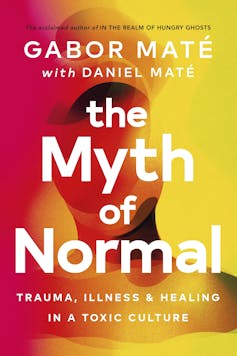from cancer to ADHD. But what does the evidence say?
- Written by Nick Haslam, Professor of Psychology, The University of Melbourne

Our health consumes a growing share of our economy and our attention, but we are not in great shape. Even as a ruinous pandemic subsides, epidemics of chronic disease, obesity, addiction and mental illness continue. Systems of care strain to cope and many of us engage in an anxious and often thankless quest for wellbeing.
In his latest book, The Myth of Normal[1], Gabor Maté offers a diagnosis for our health crisis. The problem, he suggests, is the burden of trauma[2] people endure and the toxic culture that creates and compounds it. He prescribes profound societal change, holistic healing practices and spiritual growth assisted by psychedelics[3].
Both diagnosis and prescription have proven to be controversial. Skeptics worry that Maté’s explanations for ill health oversimplify a complex and incompletely understood web of causes and that his solutions dart ahead of the scientific evidence, sometimes veering towards quackery.
Maté[4] is a Canadian physician who has become a global celebrity in wellness circles. He recently participated in a very public therapeutic dialogue with Prince Harry[5], in which he conversationally “diagnosed” the prince with ADHD.
Gabor Maté conversationally diagnosed Prince Harry with ADHD, based on reading his book.The Budapest-born son of Holocaust survivors, Maté has profound personal experience of trauma and suffering. As an infant, his mother left him in the care of strangers for several weeks to save his life, and he believes the themes of abandonment, loss and rage have continued to play out in his adult life.
In previous books, Maté has explored addiction and attention deficit hyperactivity disorder (ADHD)[6], both of which he has identified in himself, as well as the nature and cause of chronic disease.
Reverberating throughout his work are a few fundamental ideas: the centrality of trauma, the intimacy of the mind-body connection, and the culpability of capitalism and the materialistic and individualistic culture it breeds.
The trauma explanation
Maté’s 2018 book In the Realm of Hungry Ghosts[7] prosecutes the case that addictions[8] spring from the pain of unresolved trauma, rather than from brain disease or self-destructive choices. Maté combines a compassionate lack of judgement for addicts with fierce condemnation of a society that foments and criminalises substance use.
His subsequent work, Scattered Minds[9], argues ADHD is a way of coping with childhood trauma, rather than the highly heritable brain disorder[10] or form of neurodivergence[11] it is usually taken to be. (Maté has three children diagnosed with ADHD, as he is, but attributes this[12] to “emotional stresses” in their early environment, including his own parenting.) This unorthodox position, which dismisses the genetic contribution to the condition and sees it as linked to sensitivity to stress and anxiety, has been controversial.
When the Body Says No[13] argues that life stress plays a part in conditions as varied as cancer, multiple sclerosis and diabetes, whereas Hold on to Your Kids[14] makes an extended plea for more actively engaged and attuned parenting.

















